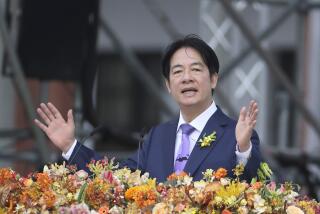China Ends Exercises Aimed at Taiwan
- Share via
BEIJING — With tensions ebbing in the Taiwan Strait, China on Monday called an end to 18 days of military exercises and generally softened its tough talk that had preceded Taiwan’s first democratic presidential election.
Meanwhile, Taiwan’s newly reelected President Lee Teng-hui avoided antagonizing Beijing anew by keeping a low profile and steering away from sensitive issues touching on independence for Taiwan.
Aides to the 73-year-old Lee said the president plans to spend the next few weeks traveling in Taiwan to thank his supporters and does not plan a major speech until his May 20 inauguration. He won Saturday’s presidential election with 54% of the vote.
This is good news in Washington, where officials had feared that a boastful post-election performance by Lee could provoke China into new military brinkmanship.
“I was encouraged by some statements that came out of both sides in the aftermath of the election,” President Clinton told reporters. He added that he hopes the softer tone marks a turning point in relations after the preelection tensions.
The official New China News Agency in Beijing announced that the third and latest round of military exercises concluded as scheduled Monday. Chinese state television aired a report Monday night on the exercises showing amphibious landings, aerial bombardment and troops parachuting from helicopters.
China began its military campaign March 8 by firing three unarmed missiles off Taiwan’s coast. A second round of naval and air exercises ended Wednesday.
In another sign of easing tensions, the U.S. aircraft carrier Independence, one of two carriers monitoring the maneuvers, is scheduled to return in a few days to its base in Japan, wire services reported Monday.
But Yin Tsong-wen, Taiwan’s National Security Council director, said Monday that he expects another round of war games by China next month to train troops for a possible invasion of Taiwan. He said the exercises will take place inside China on terrain resembling that of Taiwan.
“Their training will focus on Taiwan’s special inland situation. They will have little impact on international waters and Taiwan,” the official Taiwan Central News Agency quoted Yin as saying.
Beijing did offer its interpretation of Taiwan’s election. A state television report Monday described the vote as “the new way the Taiwanese people choose their leaders.”
Newspaper reports recorded Lee’s victory but noted that the combined votes of two candidates favoring reunification of Taiwan and the mainland, Lin Yang-kang and Chen Li-an, surpassed the total of votes received by openly pro-independence candidate Peng Ming-min. Lin received 15% of the vote, Chen 10% and Peng 21%.
Chinese Foreign Ministry spokesman Shen Guofang said in an interview Monday that China favors reopening high-level contacts with Taiwan to establish what Beijing terms the “three links”--direct communication, direct air flights and direct shipping.
But he said progress in the talks depends on how aggressively Taiwan continues to seek recognition as an independent state.
On one of the issues most sensitive to Beijing, Taiwan’s bid to win a seat in the United Nations, authorities in Taiwan appear ready to play along, at least for the time being. Aides to Lee said the government would be willing to put the U.N. bid “on the back burner.”
Times staff writer Maggie Farley in Taipei, Taiwan, contributed to this report.
More to Read
Sign up for Essential California
The most important California stories and recommendations in your inbox every morning.
You may occasionally receive promotional content from the Los Angeles Times.










